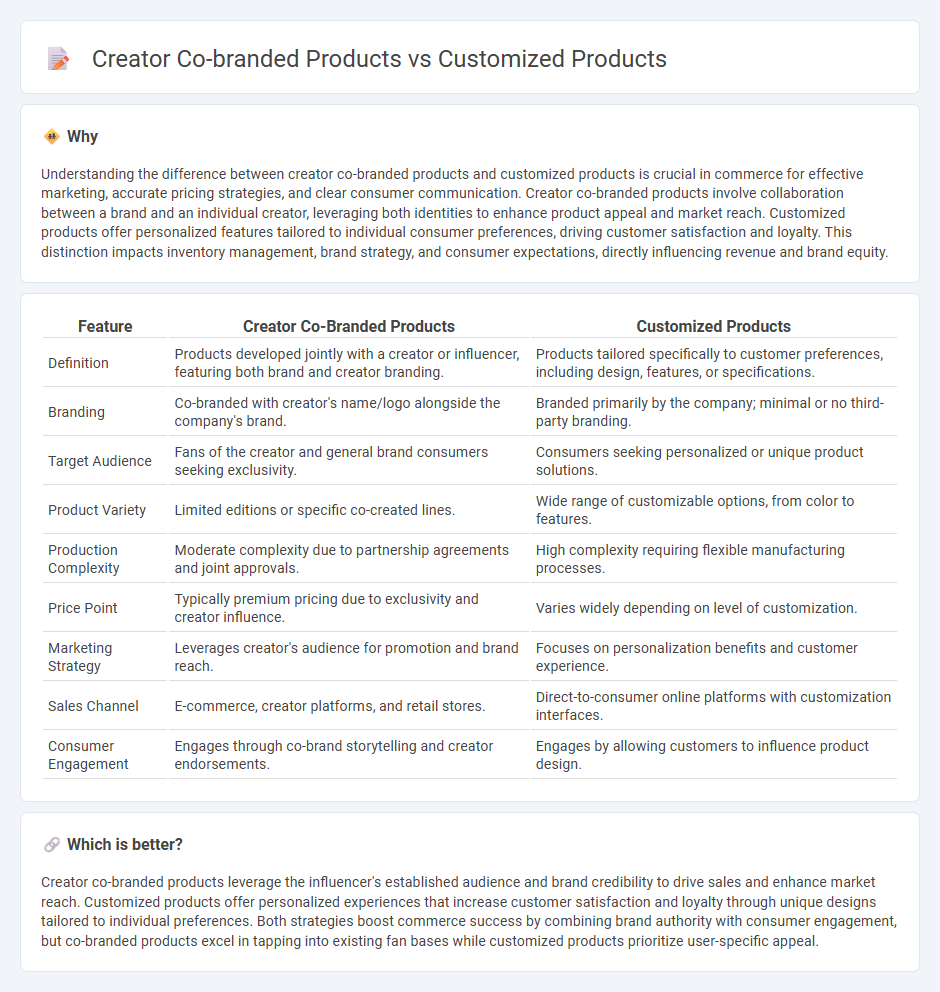
Creator co-branded products leverage the popularity of influencers or celebrities to boost brand visibility and consumer trust, combining signature styles with established brand identities. Customized products focus on individualized customer preferences, allowing consumers to tailor features, designs, or functionalities to their specific needs, enhancing satisfaction and loyalty. Explore the advantages and strategies behind these approaches to understand their impact on modern commerce.
Why it is important
Understanding the difference between creator co-branded products and customized products is crucial in commerce for effective marketing, accurate pricing strategies, and clear consumer communication. Creator co-branded products involve collaboration between a brand and an individual creator, leveraging both identities to enhance product appeal and market reach. Customized products offer personalized features tailored to individual consumer preferences, driving customer satisfaction and loyalty. This distinction impacts inventory management, brand strategy, and consumer expectations, directly influencing revenue and brand equity.
Comparison Table
| Feature | Creator Co-Branded Products | Customized Products |
|---|---|---|
| Definition | Products developed jointly with a creator or influencer, featuring both brand and creator branding. | Products tailored specifically to customer preferences, including design, features, or specifications. |
| Branding | Co-branded with creator's name/logo alongside the company's brand. | Branded primarily by the company; minimal or no third-party branding. |
| Target Audience | Fans of the creator and general brand consumers seeking exclusivity. | Consumers seeking personalized or unique product solutions. |
| Product Variety | Limited editions or specific co-created lines. | Wide range of customizable options, from color to features. |
| Production Complexity | Moderate complexity due to partnership agreements and joint approvals. | High complexity requiring flexible manufacturing processes. |
| Price Point | Typically premium pricing due to exclusivity and creator influence. | Varies widely depending on level of customization. |
| Marketing Strategy | Leverages creator's audience for promotion and brand reach. | Focuses on personalization benefits and customer experience. |
| Sales Channel | E-commerce, creator platforms, and retail stores. | Direct-to-consumer online platforms with customization interfaces. |
| Consumer Engagement | Engages through co-brand storytelling and creator endorsements. | Engages by allowing customers to influence product design. |
Which is better?
Creator co-branded products leverage the influencer's established audience and brand credibility to drive sales and enhance market reach. Customized products offer personalized experiences that increase customer satisfaction and loyalty through unique designs tailored to individual preferences. Both strategies boost commerce success by combining brand authority with consumer engagement, but co-branded products excel in tapping into existing fan bases while customized products prioritize user-specific appeal.
Connection
Creator co-branded products merge influencers' personal brands with established companies, enhancing product appeal through unique design and storytelling. Customized products allow consumers to tailor features, fostering deeper engagement and brand loyalty. Both approaches leverage personalization to drive sales and differentiate offerings in a competitive commerce landscape.
Key Terms
Personalization
Customized products offer unique personalization by allowing customers to tailor design, materials, and features to their preferences, enhancing individual expression and satisfaction. Creator co-branded products blend the creator's signature style with brand elements, delivering exclusive, limited-edition items that resonate with fan loyalty and brand identity. Discover how these personalization strategies impact consumer engagement and brand value in detail.
Brand Collaboration
Brand collaboration in customized products allows businesses to tailor items specifically to their audience, enhancing brand identity through unique designs and personal touches. Creator co-branded products combine the influence of a content creator with the brand's market presence, driving engagement and expanding reach by leveraging the creator's loyal following. Explore how these approaches can elevate your brand's collaborative strategy and maximize market impact.
Intellectual Property
Customized products grant buyers unique modifications tailored to their preferences, often limiting intellectual property (IP) claims to personal use without transferring ownership rights. Creator co-branded products involve a partnership where IP rights are shared or licensed, enabling creators to retain brand identity while expanding market reach. Explore the nuances of IP management strategies between these two approaches to optimize brand value and legal protection.
Source and External Links
15 Custom-made Products Examples for Online Merchants - Examples of customized products include personalized clothing like T-shirts, polo shirts with embroidered names, custom sports gloves, and sunglasses with tailored lens options, showcasing how brands use customization to enhance product uniqueness and customer engagement.
Custom Products--Design Your Own or Sell Online - Printful offers tools to design and sell custom products online without inventory risks, providing a wide selection of items, a free design maker, and integration with ecommerce platforms like Shopify and Etsy for launching personalized product businesses.
Design Your Own Custom Products - CafePress allows users to create custom products such as t-shirts, phone cases, drinkware, and decor using their design tool, enabling personalized gifts and unique items by uploading images, photos, or quotes with no minimum order quantities.
 dowidth.com
dowidth.com